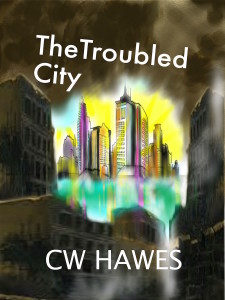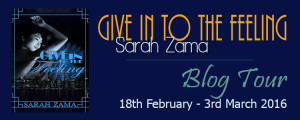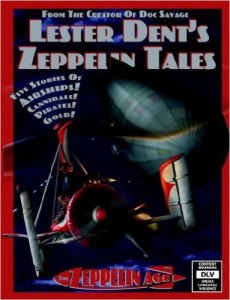The Troubled City (The Rocheport Saga #4) is coming in a few days to an ebook vendor near you!
Below is the cover and first half-dozen pages to pique your interest.
The Rocheport Saga was the first “book” I wrote after learning about the “plotless” novel. That is important, because I can’t plot the story out before hand. Try as a I might, I just can’t do it. Plotting for me is not unlike the old woman who sang a folksong to a song collector back around the beginning of the Twentieth Century. When she was finished singing and he recording, she said the song was now dead. Plotting kills the story for me.
Hence The Rocheport Saga is a massive, sprawling manuscript (over 2200 handwritten pages) and has no real plot. It is the fictional autobiography of a man after the world as we know it has come to an end. There are story arcs, but no real plot per se. Just the plot we all live out every day of our lives over the course of our lives.
Each book in the Saga, is edited from the original manuscript. I clean up the text, sometimes add new elements from things I’ve learned since writing the original, and work the manuscript into a conveniently sized novel. I’m guessing there could be up to 10 books in the series.
I’m considering putting in a cast of characters, because if you pick up a volume other than the first and start reading you will probably not understand who is who and what is what for at least some of the book. Other parts will become obvious after some reading. That is one advantage of self-publishing, I can tweak things to make the book better whenever I want.
The novel is in the form of diary entries. In The Troubled City, we start with the hero, Bill Arthur, the leader of Rocheport, going on a month long exploration to see what is out to the west of the little town of Rocheport, Missouri. What becomes quickly apparent is that there are three factions: one opposed to Bill, one supporting Bill, and those in the middle. When Bill returns to the city, he finds it slowly sinking into chaos and discovers no matter what he tries he seems incapable of stopping Rocheport from imploding. That is until he finds help from a person who will dominate the central books of the series.
The cover art is done by my wife. Enjoy the sample and look for the novel later this week!

The Third Year After That Day
March 23rd
From the diary of Melanie Hanks:
Dad and Mert said goodbye early in the morning (Merty even gave me a hug and a kiss) and rode out of town on their horses through the north gate, with Andy and Kayla. Most everyone was there to say their goodbyes. Mom, Helena, Ash, George, and I waved until they disappeared from view. That’s when the dogs started whining, especially Asta. Mermaid nuzzled Helena’s hand to get her to pet her.
Just two days ago we were all standing in the same place, saying our goodbyes, and waving until they disappeared from view. Only to have them all return yesterday with two dozen people from Boonville, who decided they wanted to move to Rocheport for a better life. Now, Dad, Mert, Andy, and Kayla have left us again and I have a feeling this time we won’t be seeing them so soon.
There were lots of tears, today. I think others were thinking the same thing. Mom and I wiped our eyes and cheeks. Rain and Raine were crying. Emma, too. Cassie tried to hide it, but I saw her wiping her eyes. Reverend Rhonda’s cheeks were wet. We might never see them again and that scares me. Dad tried to make light of that fact, but it is true. The world is a dangerous place. Merty has always been there and now he’s my only family. Well, my only real family. I love Bill and Sally and call them “Dad” and “Mom”, but they aren’t my real parents. If Bill and Mert don’t come back, I guess I’ll have to love Sally, Helena, Ash, and George all the more. They’ll be all I have.
Not everyone was sad. I noticed Billy-Rae Thornpot was smiling and Reverend Powers didn’t have that mean look on his face. Steven Crane was even laughing. I think Harry Wirtz is going to have his hands full.
Our friends made sure we knew they’re here for us. Rhonda, Harry, Jerry, Jocelyn, Ralph, Cheryl, James, and Mary are good people, as my real dad would have said. I think they really will be there, if we need the help.
The Wrodkowskis walked home with us and Mom said they could stay, if they wanted, we have plenty of room. Rain and Raine were very happy and accepted the offer.
We and the Wrodkowskis went to Reverend Rhonda’s church service and afterwards, at the community dinner, that’s when the crap hit the fan. Reverend Powers found out there are a bunch of Catholics in the Boonville group and even a priest. He like totally lost it. Even Rachel, his wife, had a tough time getting him to calm down. And Steven Crane had to be right there all totally psyched out. It was Billy-Rae Thornpot who finally got them quieted down.
I felt so embarrassed. I mean like what are all these new people going to think? We’re all a bunch of psychos? Sometimes adults act so dumb.
After dinner, everyone helped the people from Boonville get settled. Billy-Rae even got Reverend Powers to help. He didn’t help the Catholics, though. Just the Baptists. I heard Harry Wirtz grumbling about “selective treatment”. “People are people,” he said. Apparently Reverend Powers doesn’t think so.
Most of the new people are older. There are a couple kids and three teens. There’s Zibby. Kinda hard to forget a name like that! She’s tall, like five-ten, and pretty too. She has long, kinda frizzy red hair and a few freckles. She acts like she totally knows what she’s doing. Her full name is Zibby Pandora White. She’s eighteen. Grace and Blair are the other teens. Grace is nineteen, about my height, with brown hair and eyes. Blair is eighteen. He’s kinda cute. Tall and broad shouldered. Blond hair and blue eyes. I’d like to get to know him.
From the diary of Bill Arthur:
We rode west and instead of going to Boonville, turned north to New Franklin. There are somewhere between twenty and thirty people living there. Mostly along the river. They greeted us warily and we decided it would be best if we moved on.
North of New Franklin is Fayette. Home of Central Methodist University and Morrison Observatory. The town itself is pretty much abandoned. The survivors having moved to the east shore of Rogers Lake and built a small village of shacks and tents surrounded by a palisade. There are around eighty survivors: fifty former students, the remaining being townsfolk.
They were quite friendly and eager to learn about the world beyond their doorstep. We ended up sleeping in the city park because things are very crowded within the palisade.
The people of Fayette seemed to be a harmonious group. At least they didn’t admit to any infighting and I didn’t sense any. They were growing their own food, hunting, and fishing. It’s nice to know there are people who can get along.
What I found disheartening was that while the former students might have been on their way to being prepared for life in the world before That Day, they were totally unprepared for life in the world after That Day. The ones enabling the community to survive are the older folks. The ones who grew up in the ‘30s, ‘40s, and ‘50s. The ones who have some idea of how things work. Practical knowledge learned on the job or from their parents.
I suggested they glean what they can out of the college library. Preserve any books which tell how things work. They are the key to the future. The leaders of Fayette appreciated the suggestion.
March 24th
From the diary of Bill Arthur:
In the morning we bid farewell to the people of Fayette and rode west to Glasgow, a small town on the Missouri River. We found the people very friendly and eager to learn any news we had to share. They use bicycles to get around and have a couple horses which they use for farming.
Thirty-one people call Glasgow home and appear to be doing okay for themselves. Unlike us, they seem to have avoided large scale turmoil and strife. Makes me wonder how effective a leader I am. The people of both Fayette and Glasgow working together for everyone’s mutual benefit, while we are constantly fighting and bickering.
The surrounding countryside was farmland which is now reverting to grassland and forest. What was once covered in crops, is now giving birth to stands of saplings. We’ve seen no one in the open countryside. My guess is the solitaries have either died, been killed, or joined with some group.
We’re two and a half years into our new age and the survivors are clustering together, forming new communities out of the old. Doesn’t mean renegades and bandits aren’t about. There’ve always been Vandals, Huns, Vikings, you name them — the ones who’d rather take the fruits others have planted instead of planting their own. Today is no different. Mostly because people are people. That Day didn’t change who we are.
March 25th
From the diary of Melanie Hanks:
At the town hall meeting tonight, Reverend Powers, as usual, was a pain. We sang our anthem and even sang “Love is Little”, but when the time for new business came up Reverend Powers stood and demanded to know why the community wasn’t consulted concerning the Boonville people.
Harry Wirtz, who’s the leader while Dad is gone, looked really mad, although you couldn’t tell it from his voice. “Bill made the decision based on what he saw and what those people needed.”
Powers didn’t give up. “He should have discussed their situation with the community first.”
“Well, he didn’t. And since Bill isn’t here, we’re going to sit on this until he gets back,” Harry said.
Steven Crane jumped up. “What if he doesn’t come back?”
“We’ll deal with the issue then,” Harry answered.
From the look on their faces, Reverend Powers and Steven Crane didn’t like Harry’s answer but they didn’t say anymore about it. Good thing the Boonville people weren’t at the meeting.
March 26th
From the diary of Melanie Hanks:
At breakfast this morning, the Wood family and four others were sitting with Reverend Powers’ group. That doesn’t look good. The last thing we need is for more people to join Reverend Powers.
Zibby asked if she could sit with me. I said sure.
“I hear your dad is Bill Arthur, the guy who invited us to come here.”
“Yes. He’s my adopted dad.”
“Oh, sure. Lucky for you. No one took me in. I’m by myself. Some of the people back in Boonville helped me. Mostly, I just help myself.”
“I’m sorry. I mean not having anyone and all.”
“Thanks, but I’m okay. Your dad’s the one in charge, right?”
“He’s the leader.”
“Cool. I like you, Mel. We’re going to do alright.”
We talked about stuff and then went to school.
At dinner, Zibby, Blair Novak, and Grace Parchette sat with our family and the Wrodkowskis. The four of us were at one end of the table. I found out Zibby and Grace are Catholic, although Zibby doesn’t really believe it anymore.
Zibby said, “Blair, Grace, and Michael — he’s over there — and I kinda hung out together back in Boonville. We got a house together here.”
“You all live together?” I asked.
“Yeah, now we’re going to,” Zibby said.
Grace added, “We aren’t boyfriend or girlfriend. Just friends. No sex.”
“Oh, I see,” I said.
Zibby laughed. “I hear you guys have some crazy arrangements over here. At least that’s what John Wood said. He got it from that Reverend dude. The nutso.”
I practically snorted my milk at Zibby’s description. “Yeah. Powers is a pain in the butt. Doesn’t like anything. He and Dad don’t agree on much and if Powers doesn’t agree with you, look out.”
Zibby didn’t say anything. The look on her face suggested she was filing the information away. Grace and Blair just shook their heads and said it sounded like their group in a lot of ways.
We went on talking. What I didn’t like was how Zibby kept wanting to get into family stuff. Like she was prying. Maybe it’s because she doesn’t have a family? I don’t know. I just didn’t like it. When dinner was over, Blair said he was glad he made the move and was looking forward to getting to know everyone. He made me feel kinda mushy inside.
From the diary of Bill Arthur:
Glasgow is thirty-six miles away. I think it a bit much to hope for regular trade and communication with them. The travel time has to be measured in days now and there is so much to do. To spare three or four people for several days is something of a luxury and yet I don’t want to not follow up on our contact. At some point we are going to have to reach out and begin trading with other communities and sharing information and technology.
Of course we don’t have to be limited to horses. We could start making steam-powered automobiles and trucks. Or expand Jerry’s still and make more alcohol. The alcohol could be directly used in modified gasoline engines; combined with soybean or sunflower oil, maybe even corn oil, to produce biodiesel; or used in external combustion engines to produce steam. Because we have plenty of solid fuel, I’m inclined towards building steam-powered vehicles fired by solid fuel, rather than liquid. To produce liquid fuel from grains, seeds, and beans requires a lot of work. That is why we didn’t have it in the old world. It wasn’t overly cost effective. But we do have plenty of internal combustion engines around and we don’t have to fuel all of them. So it is an idea. This could be a community project. The Costigan’s Needle for Rocheport.
That science fiction novel keeps sticking in my mind. Those people stranded in another dimension, stopped their infighting by focusing on building the machine that could get them back home. We can’t go back, just as it turned out they couldn’t go back. But we can focus on the future. I want cars, not horses and buggies. Maybe building our own cars and trucks could be what pulls us together.
One valuable piece of information we got from the folks in Glasgow was confirmation as to the location of two salt licks. Eleven miles south of Glasgow is the famous Boone’s Lick site and across the river is Saline County, which was so named for the numerous salt licks that were once very actively used. The only ones that are easily identifiable are those in the Blue Lick Conservation Area, south of Marshall. Although the Glasgowites thought there were a couple others not too far to the west of them. They were not aware of anyone currently processing salt.
We bade them farewell, wished them luck, and rode west. The first town we came to was Gilliam and it was abandoned. Rusting cars. Houses slowly falling into ruin. The surrounding farmland was like all the other farmland we’ve seen. Slowly returning to forest.
Riding farther west we came to Slater and like the people in Fayette the Slater survivors had relocated to the shore of Slater Lake. Forty-some people form the community. They’ve built two dozen huts and have four tents surrounded by a wall of cars and logs. Hunting, fishing, and some extensive gardens are enabling them to get by. They invited us to stay and eat with them, which we did. Afterwards, they let us pitch our tents within the compound. We exchanged news about our respective areas. They’ve had turf wars with the people in Marshall over hunting and scavenging areas. Their own community has been pretty stable. Some leadership issues early on, but they were able to get them resolved.
Share This!




